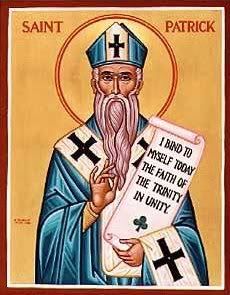Most of what we know about Patrick comes from second or third-hand reports and legends that grew up over the years, but there are two important writings that are directly attributed to him. One is "A Letter to Coroticus," addressing the soldiers under this man who raided some of Patrick's converts, a scathing complaint lodged against such raids. The other is "The Confession of Patrick," an autobiography that he wrote in Latin near the time of his death. Most of what we actually know about Patrick comes from his confession. What is remarkable is his humility, devotion, love for God, desire to serve God and the Irish people. To commemorate this day of Saint Patrick, I feel like the best words are those of the man himself; well, a translation from Latin to English thanks to Ludwig Bieler. The following is just a small portion from the beginning, but hopefully it will inspire you as you read it. I chose it not so much for the historical content, but for insight into the beliefs and faith of a true servant of God.
...I was then about sixteen years of age. I did not know the true God. I was taken into captivity to Ireland with many thousands of people---and deservedly so, because we turned away from God, and did not keep His commandments, and did not obey our priests, who used to remind us of our salvation. And the Lord brought over us the wrath of his anger and scattered us among many nations, even unto the utmost part of the earth, where now my littleness is placed among strangers.
And there the Lord opened the sense of my unbelief that I might at last remember my sins and be converted with all my heart to the Lord my God, who had regard for my abjection, and mercy on my youth and ignorance, and watched over me before I knew Him, and before I was able to distinguish between good and evil, and guarded me, and comforted me as would a father his son.
Hence I cannot be silent---nor, indeed, is it expedient---about the great benefits and the great grace which the lord has deigned to bestow upon me in the land of my captivity; for this we can give to God in return after having been chastened by Him, to exalt and praise His wonders before every nation that is anywhere under the heaven.
Because there is no other God, nor ever was, nor will be, than God the Father unbegotten, without beginning, from whom is all beginning, the Lord of the universe, as we have been taught; and His son Jesus Christ, whom we declare to have always been with the Father, spiritually and ineffably begotten by the Father before the beginning of the world, before all beginning; and by Him are made all things visible and invisible. He was made man, and, having defeated death, was received into heaven by the Father; and He hath given Him all power over all names in heaven, on earth, and under the earth, and every tongue shall confess to Him that Jesus Christ is Lord and God, in whom we believe, and whose advent we expect soon to be, judge of the living and of the dead, who will render to every man according to his deeds; and He has poured forth upon us abundantly the Holy Spirit, the gift and pledge of immortality, who makes those who believe and obey sons of God and joint heirs with Christ; and Him do we confess and adore, one God in the Trinity of the Holy Name.
For He Himself has said through the Prophet: Call upon me in the day of thy trouble, and I will deliver thee, and thou shalt glorify me. And again He says: It is honourable to reveal and confess the works of God.
{I invite you to read the whole translation at Episcopalnet or at Celtic Twilight, which contains both the Bieler translation and an older one (1905) by Rev. Dr. White of the Royal Irish Academy.}





